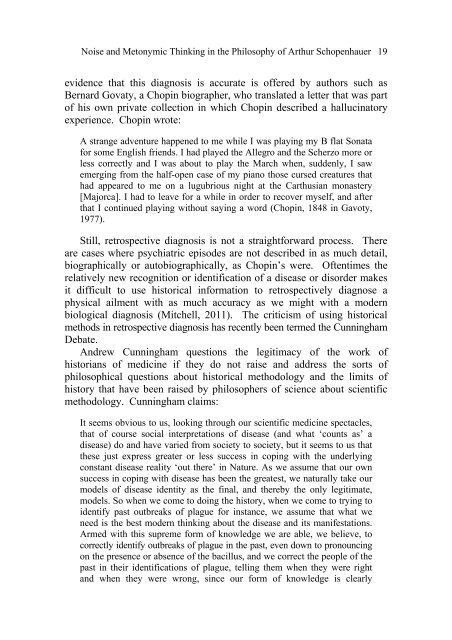978-1-4438-4527-4-sample
978-1-4438-4527-4-sample
978-1-4438-4527-4-sample
Create successful ePaper yourself
Turn your PDF publications into a flip-book with our unique Google optimized e-Paper software.
Noise and Metonymic Thinking in the Philosophy of Arthur Schopenhauer 19<br />
evidence that this diagnosis is accurate is offered by authors such as<br />
Bernard Govaty, a Chopin biographer, who translated a letter that was part<br />
of his own private collection in which Chopin described a hallucinatory<br />
experience. Chopin wrote:<br />
A strange adventure happened to me while I was playing my B flat Sonata<br />
for some English friends. I had played the Allegro and the Scherzo more or<br />
less correctly and I was about to play the March when, suddenly, I saw<br />
emerging from the half-open case of my piano those cursed creatures that<br />
had appeared to me on a lugubrious night at the Carthusian monastery<br />
[Majorca]. I had to leave for a while in order to recover myself, and after<br />
that I continued playing without saying a word (Chopin, 1848 in Gavoty,<br />
1977).<br />
Still, retrospective diagnosis is not a straightforward process. There<br />
are cases where psychiatric episodes are not described in as much detail,<br />
biographically or autobiographically, as Chopin’s were. Oftentimes the<br />
relatively new recognition or identification of a disease or disorder makes<br />
it difficult to use historical information to retrospectively diagnose a<br />
physical ailment with as much accuracy as we might with a modern<br />
biological diagnosis (Mitchell, 2011). The criticism of using historical<br />
methods in retrospective diagnosis has recently been termed the Cunningham<br />
Debate.<br />
Andrew Cunningham questions the legitimacy of the work of<br />
historians of medicine if they do not raise and address the sorts of<br />
philosophical questions about historical methodology and the limits of<br />
history that have been raised by philosophers of science about scientific<br />
methodology. Cunningham claims:<br />
It seems obvious to us, looking through our scientific medicine spectacles,<br />
that of course social interpretations of disease (and what ‘counts as’ a<br />
disease) do and have varied from society to society, but it seems to us that<br />
these just express greater or less success in coping with the underlying<br />
constant disease reality ‘out there’ in Nature. As we assume that our own<br />
success in coping with disease has been the greatest, we naturally take our<br />
models of disease identity as the final, and thereby the only legitimate,<br />
models. So when we come to doing the history, when we come to trying to<br />
identify past outbreaks of plague for instance, we assume that what we<br />
need is the best modern thinking about the disease and its manifestations.<br />
Armed with this supreme form of knowledge we are able, we believe, to<br />
correctly identify outbreaks of plague in the past, even down to pronouncing<br />
on the presence or absence of the bacillus, and we correct the people of the<br />
past in their identifications of plague, telling them when they were right<br />
and when they were wrong, since our form of knowledge is clearly


